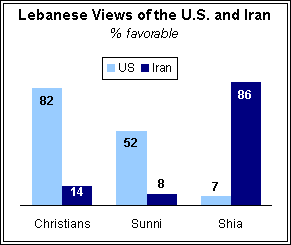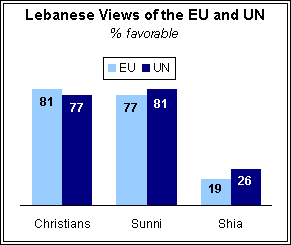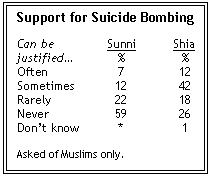by Richard Wike, Senior Researcher, Pew Global Attitudes Project
As the term of Lebanese President Emile Lahoud draws to a close, the country’s precarious political balance is once again in jeopardy. Unable to agree on a successor, Lebanon’s parliament has delayed the selection of a new president three times this year. Now scheduled to take place next week, the selection process ultimately should produce a Maronite Christian president, in accordance with the country’s political system known as “confessionalism.” This arrangement allocates the nation’s three top political jobs among its three major religious groups resulting in a Christian president, a Sunni Muslim prime minister, and a Shia Muslim speaker of the parliament.
This power sharing arrangement aims to ameliorate the deep sectarian divides in Lebanese society. And, as a recent Pew Global Attitudes survey highlights, large and important differences of opinion do exist among the Christian, Sunni, and Shia communities. However, on a number of major issues, these divisions do not run along a Muslim-Christian fault line. Instead, the sharpest divides are between Shia on the one hand and Christians and Sunnis on the other.
Rating Foreign Powers
 For decades, Lebanon has repeatedly fallen victim to power struggles involving larger nations. Today, many observers see this country of roughly four million people as one arena in the regional competition for influence between Iran and the United States. In recent years, Iran has funded and armed Hezbollah, a Lebanese Shia organization that the U.S. government has labeled a terrorist group. Meanwhile, the Lebanese armed forces have received military aid from the U.S., which has been an ally of Prime Minister Fuad Siniora.
For decades, Lebanon has repeatedly fallen victim to power struggles involving larger nations. Today, many observers see this country of roughly four million people as one arena in the regional competition for influence between Iran and the United States. In recent years, Iran has funded and armed Hezbollah, a Lebanese Shia organization that the U.S. government has labeled a terrorist group. Meanwhile, the Lebanese armed forces have received military aid from the U.S., which has been an ally of Prime Minister Fuad Siniora.
The Pew poll, conducted April-May 2007, shows the extent to which Lebanon’s three major religious communities differ in their views of these two rival powers. Overwhelmingly, Christians see America in a positive light — 82% have a favorable opinion of the United States. Shia, on the other hand, are decidedly negative — only 7% have a favorable view. Sunnis occupy a middle ground, with roughly half (52%) holding a positive view. This is a considerably higher level of support than the United States receives among Lebanon’s largely Sunni neighbors — for instance, only 21% of Egyptians, 20% of Jordanians, 13% of Palestinians, and 9% of Turks hold a positive opinion of the U.S. In fact, the U.S. receives more favorable marks among Lebanese Sunnis than among some of America’s closest European allies, including Britain (51% favorable), France (39%), and Germany (30%).
Opinions of Iran follow a markedly different pattern. Positive views of the Islamic Republic are rare in both the Christian (14% favorable) and Sunni communities (8%). However, Lebanese Shia overwhelmingly have favorable attitudes toward Iran (86%), which of course is a largely Shia country. The same pattern characterizes opinions of Iran’s controversial president, Mahmoud Ahmadinejad: 75% of Shia have confidence in Ahmadinejad to do the right thing in world affairs, compared with only 9% of Christians and 5% of Sunnis who share that view. And while roughly three-in-four (76%) Shia approve of Iran acquiring nuclear weapons, only 4% of Christians and 7% of Sunnis support the idea of a nuclear-armed Iran.
 Shia Lebanese also stand apart in their views of Iran’s closest ally in the region, Syria, which occupied much of Lebanon for nearly three decades, before removing its troops in 2005 under tremendous pressure from abroad as well as from many in Lebanon’s Christian and Sunni communities. Today, two-in-three Christians and 52% of Sunnis name Syria as one of the top two countries posing a threat to Lebanon, compared with only 8% of Shia who see Syria as a major threat. In fact, half (51%) of the Shia community names Syria as one of Lebanon’s top two allies.
Shia Lebanese also stand apart in their views of Iran’s closest ally in the region, Syria, which occupied much of Lebanon for nearly three decades, before removing its troops in 2005 under tremendous pressure from abroad as well as from many in Lebanon’s Christian and Sunni communities. Today, two-in-three Christians and 52% of Sunnis name Syria as one of the top two countries posing a threat to Lebanon, compared with only 8% of Shia who see Syria as a major threat. In fact, half (51%) of the Shia community names Syria as one of Lebanon’s top two allies.
Sharp divisions are also seen in attitudes toward other key international players, especially the European Union and the United Nations. Both organizations are rated favorably by Lebanese Christians and Sunnis. Both are quite unpopular, however, in the Shia community.
Rating National Leaders
Attitudes toward two major Lebanese political figures — Prime Minister Fuad Siniora and Hezbollah leader Hassan Nasrallah — also vary dramatically along sectarian lines. For several months, these two leaders have been locked in a political standoff, with Hezbollah staging mass protests in the capital, Beirut, calling for the ouster of the Siniora-led, anti-Syrian government. Siniora, a Sunni, is held in high regard by Christians as well as Sunnis; in both communities, more than nine-in-ten people say the prime minister is having a positive impact on the country (95% of Christians, 91% of Sunnis). In contrast, only 20% of Shia think he is having a good effect.
Meanwhile, views of Nasrallah mirror the pattern of opinion regarding his benefactor, Iran. When asked whether they have confidence in Nasrallah to do the right thing in world affairs, 82% of Shia say they have a lot or at least some confidence in the Hezbollah leader, compared with only 5% of Christians and 10% of Sunnis who express such confidence. And views of Nasrallah’s organization are very similar — 85% of Shia have a favorable opinion of Hezbollah, compared with just 7% of Christians and 10% of Sunnis.
Views on Terrorism
The 2007 Global Attitudes Pew survey1 revealed that support for terrorism has declined in much of the Muslim world over the last five years, and the decline among Lebanese Muslims has been particularly dramatic: In 2002, 74% of Lebanese believed that suicide bombing and other forms of violence against civilians could often or sometimes be justified in order to defend Islam from its enemies; today, this number has dropped to 34%.
 However, again sharp differences emerge between Sunnis and Shia. In recent years, suicide bombing has often been associated with Sunni organizations, such as the Palestinian group Hamas or al Qaeda in Iraq, but one of the first groups to use the tactic in the Middle East was Hezbollah, which deployed suicide bombers against Israeli, American, and French targets in the 1980s. Currently, support for suicide bombing remains substantial among Lebanese Shia, with a majority (54%) saying suicide attacks can either often or sometimes be justified. In contrast, support for this type of violence is much lower in the Sunni community — only 19% say these attacks can often or sometimes be justified and about six-in-ten say they can never be justified.
However, again sharp differences emerge between Sunnis and Shia. In recent years, suicide bombing has often been associated with Sunni organizations, such as the Palestinian group Hamas or al Qaeda in Iraq, but one of the first groups to use the tactic in the Middle East was Hezbollah, which deployed suicide bombers against Israeli, American, and French targets in the 1980s. Currently, support for suicide bombing remains substantial among Lebanese Shia, with a majority (54%) saying suicide attacks can either often or sometimes be justified. In contrast, support for this type of violence is much lower in the Sunni community — only 19% say these attacks can often or sometimes be justified and about six-in-ten say they can never be justified.
There is at least one issue on which the Sunni, Shia, and Christian communities can agree however: antipathy toward Osama bin Laden. Only 1% of Sunnis, 2% of Shia, and 2% of Christians say they have a lot or some confidence in the al Qaeda leader to do the right thing in international affairs.


